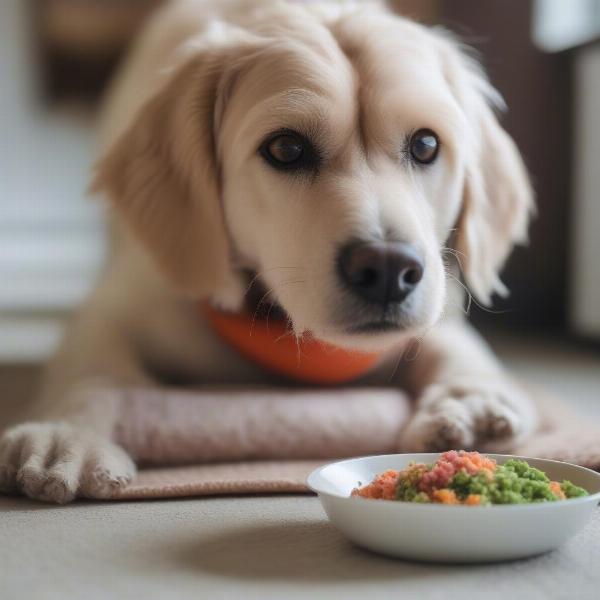Raw dog food diets, particularly those featuring turkey, are gaining popularity among dog owners seeking a more natural approach to canine nutrition. But what exactly is raw turkey dog food, and is it the right choice for your furry friend? This article will delve into the benefits, risks, and essential considerations when choosing a raw turkey diet for your dog.
Understanding the Appeal of Raw Turkey for Dogs
 Dog eating raw turkey
Dog eating raw turkey
Turkey offers a lean protein source packed with essential amino acids necessary for muscle development and overall health. It’s also a good source of vitamins and minerals, including B vitamins, phosphorus, and selenium. Compared to other poultry like chicken, turkey can be a good option for dogs with sensitivities. A raw diet aims to mimic a dog’s ancestral diet, potentially offering benefits such as improved digestion, shinier coat, and increased energy levels.
Is Raw Turkey Safe for Dogs?
While raw turkey can offer nutritional benefits, it’s crucial to acknowledge the potential risks. Raw meat can carry harmful bacteria like Salmonella, E. coli, and Campylobacter, posing a threat to both dogs and humans handling the food. Nutritional deficiencies can also occur if the raw diet isn’t carefully balanced. Consult with a veterinarian or a certified canine nutritionist to ensure your dog’s raw turkey diet meets all their nutritional requirements.
Preparing Raw Turkey Dog Food
Sourcing high-quality, human-grade turkey is paramount. Proper hygiene practices are essential during preparation to minimize bacterial contamination. Always wash your hands thoroughly, sanitize surfaces, and use separate cutting boards and utensils for raw meat. Freezing the turkey for a few days can also help reduce the bacterial load. A complete and balanced raw turkey dog food diet should include muscle meat for dogs and other essential nutrients, so consult a professional for guidance on proper ratios and supplementation. Remember, feeding a diet of only instant hot dogs will not provide complete nutrition for your canine companion.
Transitioning to a Raw Turkey Diet
If you’re considering switching your dog to a raw turkey diet, do so gradually. Sudden dietary changes can upset your dog’s digestive system. Start by mixing small amounts of raw turkey with their current food, gradually increasing the proportion of raw food over several weeks. Monitor your dog closely for any signs of digestive upset, such as vomiting or diarrhea. If you’re concerned about serving cooked dog food alongside raw, consult your vet for advice.
Signs of a Balanced Raw Turkey Diet
A dog thriving on a raw turkey diet will exhibit a healthy coat, bright eyes, good energy levels, and firm, regular stools. Regular veterinary checkups are crucial to monitor your dog’s health and ensure the diet is meeting their nutritional needs.
Is Raw Turkey Right for All Dogs?
Puppies, senior dogs, pregnant or lactating dogs, and dogs with compromised immune systems may have different nutritional requirements and may be more susceptible to bacterial infections from raw food. Always consult your veterinarian before switching these dogs to a raw turkey diet. They might benefit from other dietary options, like a dog and partridge menu, always tailored to their specific needs.
Conclusion
Raw dog food turkey can be a healthy and nutritious option for some dogs, offering potential benefits such as improved digestion and a shinier coat. However, it’s essential to understand the risks associated with raw feeding and take precautions to minimize them. Always consult with a veterinarian or canine nutritionist before making any significant dietary changes, especially when considering raw feeding. raw turkey dog food requires careful planning and preparation to ensure it’s both safe and nutritionally balanced for your canine companion.
FAQ
- Is raw turkey better than cooked turkey for dogs? Both raw and cooked turkey can be part of a healthy dog diet, but raw turkey carries the risk of bacterial contamination.
- Can I feed my dog only raw turkey? No, a balanced raw diet should include other essential nutrients. Consult a professional for guidance.
- How much raw turkey should I feed my dog? The amount depends on your dog’s age, weight, activity level, and overall health. Consult a vet or canine nutritionist.
- What are the signs of Salmonella poisoning in dogs? Lethargy, vomiting, diarrhea, fever, and decreased appetite. Contact your veterinarian immediately if you suspect your dog has Salmonella poisoning.
- How can I minimize the risks of bacterial contamination in raw turkey? Source high-quality meat, practice proper hygiene, freeze the turkey for a few days, and handle it carefully.
- Can puppies eat raw turkey? Consult your veterinarian before feeding raw food to puppies, as their immune systems are still developing.
- What supplements should I add to my dog’s raw turkey diet? Consult a vet or canine nutritionist to determine which supplements are necessary to ensure a balanced diet.
ILM Dog is your trusted source for comprehensive dog care information. We offer expert advice on breed selection, health, training, nutrition, grooming, and more. Our goal is to empower dog owners worldwide with the knowledge and resources to provide the best possible care for their furry companions. Whether you’re considering a raw food diet or have questions about any other aspect of dog care, ILM Dog is here to help. Contact us today for personalized guidance: Email: [email protected], Phone: +44 20-3965-8624. Visit our website for more information: ILM Dog.